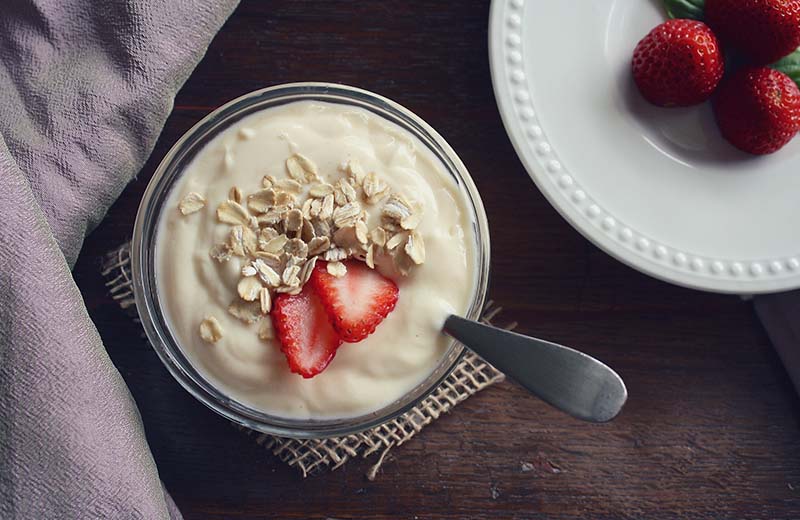Your body contains both good and bad bacteria in various places, but especially in your gut. The good bacteria are called probiotics. Antibiotics, a poor diet, medication, illness, emotional stress, inflammatory gluten, genetically modified food, alcohol, lack of exercise, smoking, poor sleeping habits, and over-sanitation will deplete your system of good bacteria.
If you do not restore probiotics to your system either through fermented food or supplements, the imbalance in your gut could make you become obese and develop allergies, experience embarrassing diarrhea, and have thyroid imbalances, autism, psoriasis, joint pain and chronic fatigue, along with immunity, heart, mental health, and digestion problems.
There are two types of probiotics. Lactobacillus can be found in fermented foods. Particular strains of lactobacillus help resolve lactose intolerance and diarrhea issues. Bifidobacterium is the one that eases irritable bowel syndrome. It can be found in some dairy products.

If you develop health problems that you suspect were caused by a probiotic deficiency, you may want to ask your doctor which probiotic would help you to reverse your health issue. He can tell you which type of probiotic you need and also the strain that you need.
Probiotics benefit your health in the following ways:
1. Balance Digestive System
It is a complex microbiome that exists in a healthy person’s gut. A balanced digestive system is what consuming fermented foods and taking probiotic supplements achieves. The bad bacteria never go away, but the good bacteria always need to be replenished.
Sugar is a major problem in the American standard diet (SAD) for many reasons. Where probiotics are concerned, sugar kills off the good bacteria, getting your gut flora out of balance. Many foods and habits deplete your system of probiotics, but sugar is one of your major enemies when it comes to your digestive health.
Why should you care? About 70 to 80 percent of your immune system is located in your digestive tract and about 95 percent of your serotonin is manufactured there. All of your body’s systems are affected by the health of your gut.
Without probiotics, inflammation will eventually develop. Inflammation in the digestive tract causes leaky-gut syndrome, which literally means that your gut has developed holes. These holes allow food particles to leak into your bloodstream and cause problems, such as inflammatory bowel diseases, including Chrone’s and ulcerative colitis. It also causes malabsorption and mental problems, thyroid dysfunction, and autoimmune conditions.
2. Prevent and Treat Diarrhea
Much evidence exists that link diarrhea to digestive imbalance. Some diarrhea forms include traveler’s diarrhea, acute diarrhea, and antibiotic-assisted diarrhea. Probiotics ease the pain associated with irritable bowel syndrome.
If you start off your probiotic regimen by taking too much of the good bacteria, you can cause diarrhea instead of preventing it. There is a difference between various probiotics, including strains within them. Some improve your health with the use of up to 1 trillion CFUs. Others only take 50 million CFUs. It is best to consult a medical professional before starting any new regimen.
3. Improve Mental Health Conditions
Your gut manufactures nearly 95 percent of your serotonin, which affects sleep and mood.
The good bacteria are effective against health problems that are associated with inflammation, which include the mental health conditions of attention-deficit hypersensitivity, autism-spectrum disorders, and mood disorder. Because leaky-gut syndrome can be linked to autism and depression, good bacteria can improve those conditions by healing the holes in your gut. Animal studies show that anxiety may also be relieved.
Probiotics cause the creation of vitamin B12, which helps you to become more emotionally stable. Good bacteria also improve your mental capacity.
4. Help Keep Heart Healthy
Homocysteine can cause you to get heart disease. Probiotics produce vitamin B12, which lowers these amino acid levels in your body.
Good bacteria improve the amount of substances in the blood that is related to the heart. This lowers blood pressure, regulates the number of enzymes and proteins that the kidney secretes to lower blood pressure, reduces insulin resistance, and activates antioxidants.
The most improvement is possible in individuals who already have high blood pressure who take at least 100 billion colony forming units (CFUs) of various strains of probiotics for at least two months.
5. Reduce Severity of Some Allergies
It is thought that good bacteria reduce food allergies because of their effectiveness against chronic inflammation in the gut and because of their ability to regulate immune responses. Evidence of this exists in babies that have poor flora balance in their guts who then develop food allergies by the time they are two years old.
Prebiotics and probiotics are still being studied for their effectiveness in boosting immunity. Symbiotic is the term that is used when referring to both of them. Novel strains of probiotics, bifidobacteria, and LAB are thought to boost immune systems.
6. Probiotics Can Help Reduce Symptoms of Digestive Issues
The digestive system is your neurological system’s second largest area, which makes your gut called both a second brain and the enteric nervous system. Many functions are directed from this area, but part of what probiotics do for the digestion is to move the food you eat through your digestive tract.
Various inflammatory bowel diseases such as Chrone’s disease and ulcerative colitis ease away with the use of probiotics. Probiotic strains and the type of disease are important factors that your medical profession will consider if treating you for gastrointestinal diseases.
7. Boosts Immune System
Good bacteria in your gut can prevent you from getting some diseases that result from a bad immune system and chronic inflammation. The way that It does this is by stimulating the secretion of regulatory and IgA T-cells in the gut, where about 80 percent of the immune system lies.
Seniors should benefit from the power of good bacteria to fight off the flu or the common cold. Probiotics are still being studied for their effectiveness in treating many different ailments that stem from a poor immune system, including HIV, and they offer people much hope.